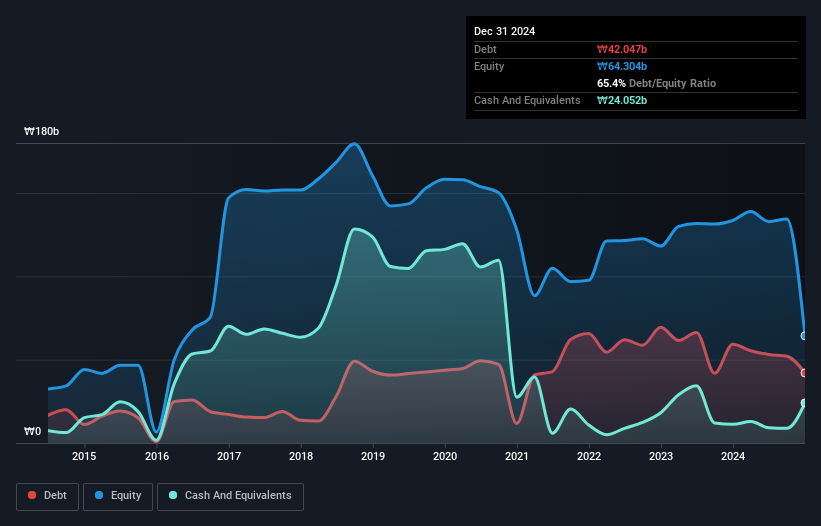- South Korea
- /
- Semiconductors
- /
- KOSDAQ:A066980
Hansung Cleantech (KOSDAQ:066980) Has Debt But No Earnings; Should You Worry?
The external fund manager backed by Berkshire Hathaway's Charlie Munger, Li Lu, makes no bones about it when he says 'The biggest investment risk is not the volatility of prices, but whether you will suffer a permanent loss of capital.' So it seems the smart money knows that debt - which is usually involved in bankruptcies - is a very important factor, when you assess how risky a company is. We can see that Hansung Cleantech Co., Ltd. (KOSDAQ:066980) does use debt in its business. But the real question is whether this debt is making the company risky.
When Is Debt A Problem?
Generally speaking, debt only becomes a real problem when a company can't easily pay it off, either by raising capital or with its own cash flow. Part and parcel of capitalism is the process of 'creative destruction' where failed businesses are mercilessly liquidated by their bankers. While that is not too common, we often do see indebted companies permanently diluting shareholders because lenders force them to raise capital at a distressed price. Of course, plenty of companies use debt to fund growth, without any negative consequences. The first step when considering a company's debt levels is to consider its cash and debt together.
What Is Hansung Cleantech's Debt?
The image below, which you can click on for greater detail, shows that Hansung Cleantech had debt of ₩42.0b at the end of December 2024, a reduction from ₩59.2b over a year. However, it also had ₩24.1b in cash, and so its net debt is ₩18.0b.

How Healthy Is Hansung Cleantech's Balance Sheet?
According to the last reported balance sheet, Hansung Cleantech had liabilities of ₩87.2b due within 12 months, and liabilities of ₩24.7b due beyond 12 months. Offsetting this, it had ₩24.1b in cash and ₩18.7b in receivables that were due within 12 months. So it has liabilities totalling ₩69.1b more than its cash and near-term receivables, combined.
This is a mountain of leverage relative to its market capitalization of ₩79.8b. This suggests shareholders would be heavily diluted if the company needed to shore up its balance sheet in a hurry. The balance sheet is clearly the area to focus on when you are analysing debt. But it is Hansung Cleantech's earnings that will influence how the balance sheet holds up in the future. So if you're keen to discover more about its earnings, it might be worth checking out this graph of its long term earnings trend.
See our latest analysis for Hansung Cleantech
Over 12 months, Hansung Cleantech made a loss at the EBIT level, and saw its revenue drop to ₩183b, which is a fall of 50%. That makes us nervous, to say the least.
Caveat Emptor
Not only did Hansung Cleantech's revenue slip over the last twelve months, but it also produced negative earnings before interest and tax (EBIT). Its EBIT loss was a whopping ₩51b. Considering that alongside the liabilities mentioned above does not give us much confidence that company should be using so much debt. So we think its balance sheet is a little strained, though not beyond repair. We would feel better if it turned its trailing twelve month loss of ₩78b into a profit. So in short it's a really risky stock. The balance sheet is clearly the area to focus on when you are analysing debt. But ultimately, every company can contain risks that exist outside of the balance sheet. To that end, you should learn about the 3 warning signs we've spotted with Hansung Cleantech (including 1 which is a bit unpleasant) .
If you're interested in investing in businesses that can grow profits without the burden of debt, then check out this free list of growing businesses that have net cash on the balance sheet.
Valuation is complex, but we're here to simplify it.
Discover if Hansung Cleantech might be undervalued or overvalued with our detailed analysis, featuring fair value estimates, potential risks, dividends, insider trades, and its financial condition.
Access Free AnalysisHave feedback on this article? Concerned about the content? Get in touch with us directly. Alternatively, email editorial-team (at) simplywallst.com.
This article by Simply Wall St is general in nature. We provide commentary based on historical data and analyst forecasts only using an unbiased methodology and our articles are not intended to be financial advice. It does not constitute a recommendation to buy or sell any stock, and does not take account of your objectives, or your financial situation. We aim to bring you long-term focused analysis driven by fundamental data. Note that our analysis may not factor in the latest price-sensitive company announcements or qualitative material. Simply Wall St has no position in any stocks mentioned.
About KOSDAQ:A066980
Good value with adequate balance sheet.
Market Insights
Community Narratives



